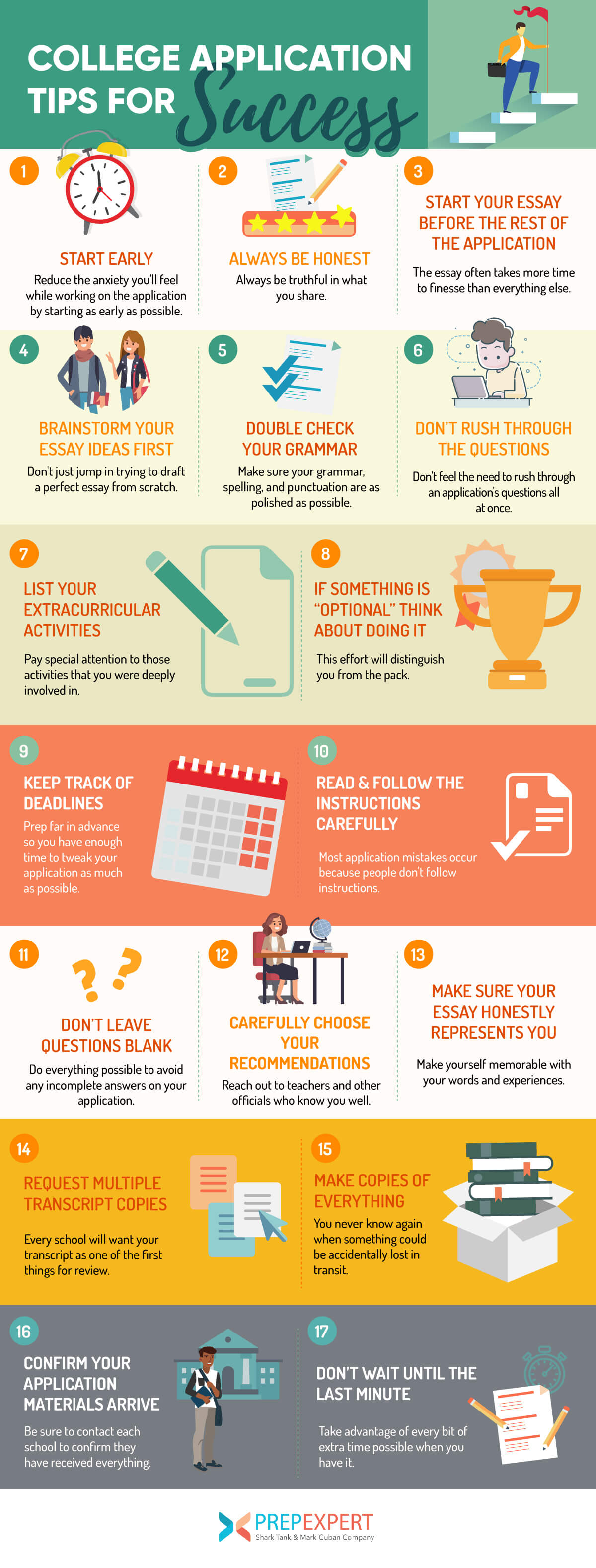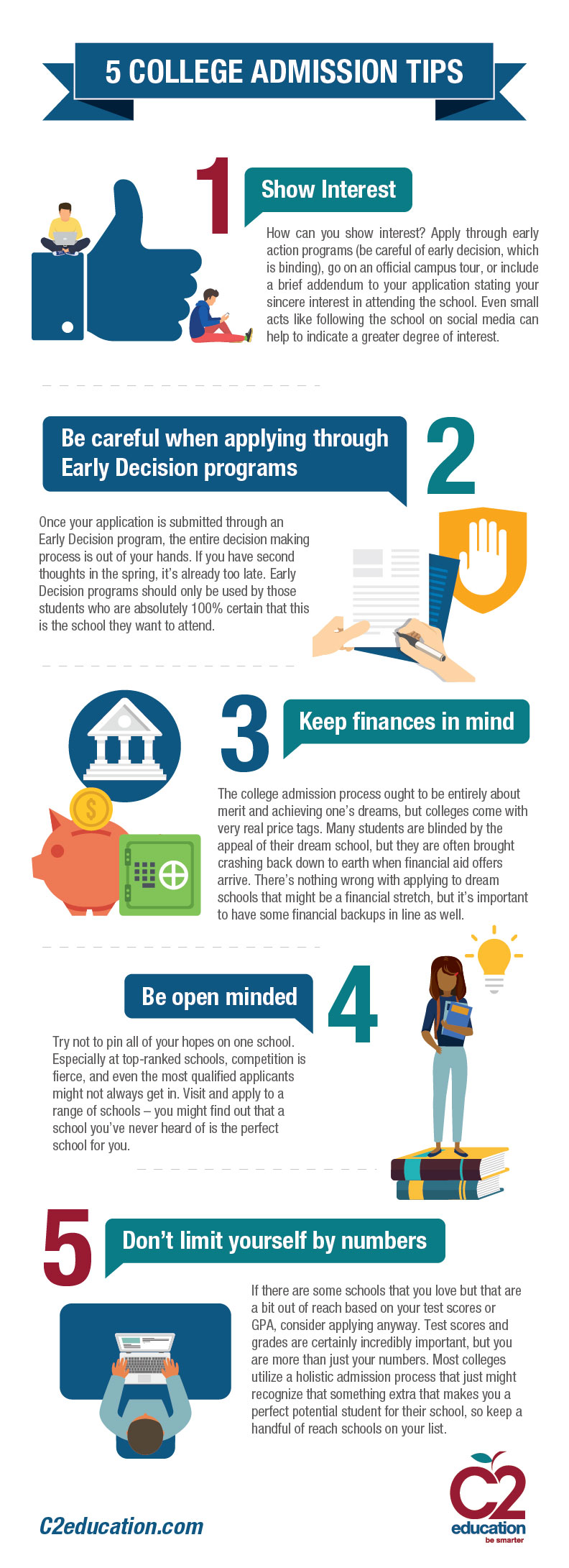Essential College Application Tips: Your Guide to a Successful College Admission
Introduction: The College Application Process
Applying to college can be an overwhelming experience. From gathering documents to writing personal statements, there are many steps involved in ensuring that your application stands out. However, with the right strategy and some well-informed tips, the process can be much smoother. This guide will provide you with essential college application tips that will help you submit a polished and compelling application.

1. Start Early and Stay Organized
1.1 Begin Your College Search Early
The first step in the application process is identifying the colleges you’re interested in. Starting early gives you time to research various institutions and find the ones that match your academic and personal preferences. Factors like location, size, programs offered, and campus culture should all be taken into consideration.
-
Create a List of Potential Colleges: Narrow down your options based on your preferences and research each school’s admission requirements.
-
Visit Campuses: If possible, visit the campuses of your top choices. This can give you a better sense of the environment and help you decide if it’s the right fit for you.
1.2 Stay Organized with Deadlines
The college application process can be long and complex, with multiple deadlines for various tasks. Create a checklist or use a calendar to keep track of important dates, such as application deadlines, financial aid deadlines, and standardized test dates.
-
Set Milestones: Break the process into smaller, manageable tasks, such as writing your personal statement, collecting recommendation letters, and taking required exams.
-
Use Tools: Tools like Google Calendar or college-specific apps can help you stay organized.
2. Perfect Your Personal Statement and Essays
2.1 Write a Compelling Personal Statement
Your personal statement is one of the most important components of your college application. It provides the admissions committee with insight into who you are beyond your grades and test scores. Make sure your essay reflects your personality, achievements, and why you want to attend college.
-
Be Authentic: Don’t try to write what you think the admissions officers want to hear. Instead, focus on what makes you unique and why that will help you succeed in college.
-
Show, Don’t Just Tell: Use specific examples and stories to illustrate your qualities rather than just stating them. This makes your essay more engaging and memorable.

2.2 Focus on the “Why”
Many college application essays ask you to explain why you want to attend that particular school. Be sure to research each institution thoroughly so you can answer this question thoughtfully. Show that you’ve done your homework and explain how the school’s programs, values, and culture align with your academic and career goals.
-
Customize Each Essay: Tailor your essay to each school, addressing how the specific features of the college will help you achieve your goals.
-
Connect Your Interests: Link your passions and experiences to the opportunities the college offers.
2.3 Proofread and Edit
Once you’ve written your personal statement or essays, take the time to proofread and edit them. A polished essay is key to making a good impression. Ask teachers, family members, or mentors to review your work and provide constructive feedback.
-
Check for Grammar and Spelling: Minor errors can detract from the quality of your application.
-
Ensure Clarity and Flow: Make sure your essay is easy to read and effectively communicates your message.
3. Gather Strong Letters of Recommendation
3.1 Choose the Right Recommenders
Most colleges require letters of recommendation from teachers, counselors, or mentors. Choose recommenders who know you well and can speak to your strengths. Ideally, select teachers who have taught you in subjects related to your intended major.
-
Ask Early: Give your recommenders plenty of time to write thoughtful letters. Aim to ask at least 4-6 weeks before the application deadline.
-
Provide Supporting Materials: Share your resume, personal statement, or any other documents that will help your recommenders write a strong letter.
3.2 Build Strong Relationships with Your Recommenders
Building relationships with your teachers and mentors throughout high school is crucial. Regularly engage with them, whether by asking for academic advice or participating in extracurricular activities. Strong relationships lead to more personalized and compelling recommendation letters.
4. Submit an Impressive Resume
4.1 Highlight Relevant Experience
Many college applications allow you to submit a resume alongside your application. This is your opportunity to showcase your achievements, volunteer work, internships, and extracurricular activities. Focus on experiences that demonstrate your leadership, dedication, and skills.
-
Be Concise: Limit your resume to one or two pages, emphasizing the most important experiences that align with your goals.
-
Tailor for Each College: If you’re applying to schools with specific focuses, such as engineering or the arts, tailor your resume to highlight relevant achievements.
4.2 Showcase Your Skills
In addition to academic achievements, colleges are looking for students who bring unique skills to the campus. Whether it’s language proficiency, technical abilities, or artistic talents, include these skills in your resume to stand out.
5. Prepare for Standardized Tests
5.1 Know the Test Requirements
While many colleges have moved to test-optional policies, some still require standardized tests like the SAT or ACT. It’s important to know the requirements for each school you’re applying to and plan accordingly.
-
Research Test-Optional Policies: Some schools may not require standardized test scores, but submitting strong scores can enhance your application.
-
Plan Your Test Dates: Give yourself enough time to study and retake the test if necessary.

5.2 Prepare Strategically
Effective test preparation is crucial to performing well on standardized tests. Use official prep materials, take practice tests, and consider enrolling in test prep courses if necessary.
-
Use Study Guides: Invest in test prep books or online resources to familiarize yourself with the test format.
-
Practice Time Management: Practice completing sections within the allotted time to improve speed and accuracy.
6. Financial Aid and Scholarships
6.1 Understand Financial Aid Options
The cost of college can be daunting, but there are numerous financial aid options available. Start by completing the Free Application for Federal Student Aid (FAFSA) to determine your eligibility for federal financial aid. Many colleges also offer institutional aid based on need or merit.
-
Look for Scholarships: Many organizations, schools, and companies offer scholarships to students. Search online databases and inquire at your school for available opportunities.
-
Apply for Multiple Scholarships: The more scholarships you apply for, the greater your chances of receiving funding.
6.2 Keep Track of Financial Aid Deadlines
Financial aid deadlines are often different from application deadlines. Make sure you submit all required documents on time to maximize your chances of receiving aid.
-
Set Reminders: Use calendar tools to set reminders for financial aid submission deadlines.
-
Review Award Letters: Once you receive your financial aid package, review it carefully to ensure you understand your options.
7. Frequently Asked Questions About College Applications
Q1: How early should I start my college application?
A1: It’s ideal to start your college application process as early as possible, ideally during your junior year of high school. This gives you plenty of time to research colleges, write essays, and meet deadlines.
Q2: How can I make my application stand out?
A2: To stand out, focus on your unique experiences and strengths. Write a compelling personal statement, choose strong recommenders, and showcase your skills and extracurricular involvement.
Q3: Do I need to submit SAT/ACT scores?
A3: Some colleges are test-optional, but others may still require SAT or ACT scores. Check each school’s admission policies to determine if you need to submit test scores.
Q4: How can I find scholarships?
A4: Many scholarships are available through high schools, community organizations, and online databases. Be proactive in searching for and applying to as many scholarships as possible.
Conclusion: Navigating the College Application Journey
The college application process can be complex, but with the right approach, it can be a rewarding experience. By starting early, staying organized, and focusing on the details, you can submit a strong application that showcases your best self. Remember, college admissions officers are looking for students who are not only academically capable but also passionate, engaged, and ready to contribute to their campus community.
Start planning today, follow these college application tips, and you’ll be on your way to a successful college admission!








